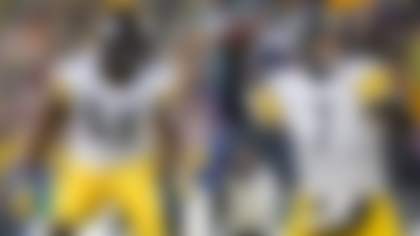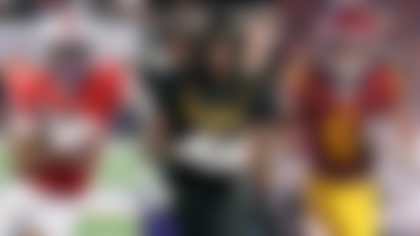Akbar Gbajabiamila, an analyst on NFL Fantasy Live, played defensive end for three NFL teams from 2003 to 2007. In his weekly "Inside Out" column, he offers a player's perspective on topical events around the league.
This week, Gbajabiamila recalls the first concussion he suffered as a professional player. That was more than nine years ago, and much has changed since then, most notably the awareness and treatment of head injuries. Through Week 13 this season, 58 different players have missed at least one game while listed on the injury report as having a "head" or "concussion" injury. Those 58 players have missed a combined 158 games so far this season.
When Chicago Bears receiver Devin Hester left a game against the Minnesota Vikings two weeks ago with a concussion, he became the third starter on his team to suffer a serious head injury in a span of three weeks, following in the footsteps of quarterback Jay Cutler and defensive end Shea McClellin. Around the same time, the Philadelphia Eagles were also hit with major concussions, losing quarterback Michael Vick and running back LeSean McCoy.
The recent rash of head injuries got me thinking about my first concussion. It happened in the fourth NFL game of my career, just four months after I had signed a rookie free-agent contract with the reigning AFC Champion Oakland Raiders. We were wrapping up the 2003 preseason with a game against the Dallas Cowboys, and I was on the bubble. I knew I needed to make an impression to have a chance at sticking on coach Bill Callahan's final 53-man roster.
I went on to sack Cowboys quarterback Quincy Carter, Bill Parcells' newly anointed starter, and notch a couple of solo tackles. Needless to say, I was feeling pretty good about my chances. Like many players on the fringe of making a roster, I knew my odds would only get better with a solid showing on special teams. We combined with the Cowboys to put 66 points on the scoreboard that day, so I had plenty of opportunities to impress the coaching staff.
On one particular kickoff, I raced down the field, keeping my lane discipline. My sights were locked on the ball carrier, and I was anticipating running through the man on impact.
Now, keep in mind, when I entered the NFL, I was 6-foot-6, weighed 260 pounds and ran a 4.59-second 40-yard dash. I knew the Cowboys had someone dialed in on me, and sure enough, in my peripheral vision, I saw the wing man running at me at top speed. Then, BOOM! I went down and was unconscious for a second.
I was fighting for a job and knew I couldn't afford to be knocked out. So I willed myself back to my feet. I got up like a drunken man and started searching for that big hit, but the play was already over. I made my way to the sideline, where I received medical attention.
What did the hit feel like? Imagine someone hitting you over the head as hard as possible with a cast-iron frying pan.
Everything around me at that moment sounded faint, as if I were at the bottom of a swimming pool hearing conversations above me. My understanding of my surroundings was foggy, almost like that feeling you get when you lose your train of thought, and you can't access it quickly enough.
I sat out for just a couple of series before I was back in on defense. Athletes are creatures of habit. We have great muscle memory, thanks to the repetition it takes to perform well. We saw that with Cutler and the San Francisco 49ers' Alex Smith in Week 11. Both continued to play after taking big hits before eventually being diagnosed with concussions and removed from the field.
When I went back in, I had difficulty understanding the defensive play calls, as if I was hearing them for the first time. I knew something wasn't right, but I kept going, hanging on to the following locker-room commandments: Get your mind right and Play the game with no regard to your personal safety. This thought process allows you to enter the battleground fearless ... and to get back up when everything is telling you to stay down.
The next day, I had a debilitating headache, like what comes with a bad hangover. I wanted to be in complete silence and darkness; light aggravated my eyes, and the internal conversations in my head were earsplitting.
Ironically, I didn't realize how painful the sudden impact of a collision can really be until after I was done playing football, when I was shooting an Adidas commercial with Reggie Bush. With no adrenaline pumping through my veins, I had to simulate a big hit.
After thumping one of the actors, I realized that while I could still simulate the power, I didn't have my mind right for the pain that I had become accustomed to taking as a player. The strike was so excruciating, I asked myself, "How did I do this for a living?"
Follow Akbar Gbajabiamila on Twitter _@AkbarGbaja_.



